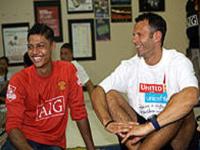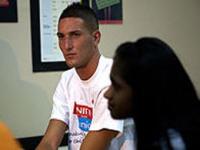
Feature Story
United for UNICEF: Manchester United visit highlights HIV and rights of vulnerable children
27 August 2009
27 August 2009 27 August 2009A version of this story was first published at UNICEF.org

UNICEF UK Ambassador and Manchester United player Ryan Giggs enjoys a lively conversation with a refugee teen whose parents come from Myanmar and who spends his free time as a football coach for younger refugee children in Malaysia.
Credit: UNICEF Malaysia
Manchester United stars Ryan Giggs, Patrice Evra and Federico Macheda, along with Manchester United Foundation Chief Executive John Shiels, took time out of the club's pre-season tour of Asia in mid-July to help UNICEF champion the rights of vulnerable children and those affected by HIV in Malaysia.
The football stars visited Positive Living, a programme operated by the community-based PT Foundation. The group spent time with 10 young people from various challenging backgrounds – including children from families affected by HIV, and children whose parents are sex workers or drug users, as well as street children and young refugees.
Despite Malaysia’s progress in child health and education, many children still find themselves living on the margins of society as a result of discrimination, stigma and prejudice. These marginalized children are in the highest-risk category for HIV infection.
Stark realities for children
By joining these children here today and showing our support, we hope to send out a powerful message – that all children, no matter their background, where they live or their HIV status, should be treated equally.
Ryan Giggs, Manchester United footballer
Joined by the players for an intimate discussion, the young people at Positive Living shared their feelings, dreams and daily experiences, revealing the stark realities of life for youths shadowed by HIV, drug abuse, violence, exploitation and displacement.
Mr. Giggs spoke with Asha (not her real name), 15, whose father died as a result of AIDS-related illness. Asha recalled the day her mother revealed her own HIV status.
“When my mother told me that she was HIV-positive, I panicked and didn’t know what to do,” she said. “I could not accept it.”
After her father died, Asha and her mother were forced to move from their home and community due to AIDS stigma and discrimination. “After my father passed away everyone hated my mother. Everyone hurt her,” she said.
Fair and equal treatment

Credit: UNICEF Malaysia
Through their visit, the Manchester United players aim to highlight the facts about HIV, help break down the prejudice and stigma faced by marginalized children; and advocate for their right to be treated fairly.
“It’s tragic to hear how marginalized children and those affected by HIV suffer as result of stigma,” said Mr. Giggs. “But by joining these children here today and showing our support, we hope to send out a powerful message – that all children, no matter their background, where they live or their HIV status, should be treated equally.”
UNICEF is working with the government and partners to challenge discrimination, protect children, reduce stigma and promote awareness of these issues – including HIV prevention in a country where an estimated 80,000 people are living with the virus.
Challenging stigma is vital
“Fighting against stigma is a vital step in protecting marginalized children,” said Mr. Evra. “To do this, we must all learn the facts about HIV: You cannot get HIV by playing with children who are HIV-positive.”
 Manchester United player Federico Macheda participates in a sharing session with vulnerable children in Malaysia.
Manchester United player Federico Macheda participates in a sharing session with vulnerable children in Malaysia. Credit: UNICEF Malaysia
The footballers’ visit represents the latest development in the ground-breaking 10-year ‘United for UNICEF’ partnership between Manchester United and UNICEF and highlights the club’s continuing commitment to UNICEF’s 'Unite for Children, Unite against AIDS' global campaign. UNICEF is a cosponsor of UNAIDS.
Since 1999, the partnership has raised over $3.75 million, benefiting over 1.5 million children worldwide. In 2007, the club donated more than $150,000 to UNICEF Malaysia for youth HIV-prevention programmes.
“Lasting solutions for the next generation must address both protection from HIV and protection of children's rights," said UNICEF Representative to Malaysia Youssouf Oomar. "These rights are not merely the benefit of a few but the entitlement of all children, regardless of their identity, HIV status, geographical location or gender."
The ‘United for UNICEF’ 10th anniversary coincides with the 20th anniversary of the Convention on the Rights of the Child this year.
United for UNICEF: Manchester United visit highli
Cosponsors:
Partners:
Unite for Children, Unite against AIDS
United for UNICEF
Positive Living
Feature stories:
Peer educators raising HIV awareness through sport in Trinidad and Tobago (03 June 2009)
UNICEF working to teach AIDS prevention to young people in Guinea (16 April 2009)
UNICEF: Communities provide a bigger ‘family’ for orphaned children in Rwanda (09 March 2009)
Third stocktaking report on children and AIDS (01 December 2008)
Multimedia:
UNICEF photo essay on paediatric HIV in Zambia
Publications:
Children and AIDS: Third stocktaking report, 2008 (pdf, 1.90 Mb.)
Children and AIDS: Third stocktaking report, 2008, Summary (pdf, 2.71 MB.)



